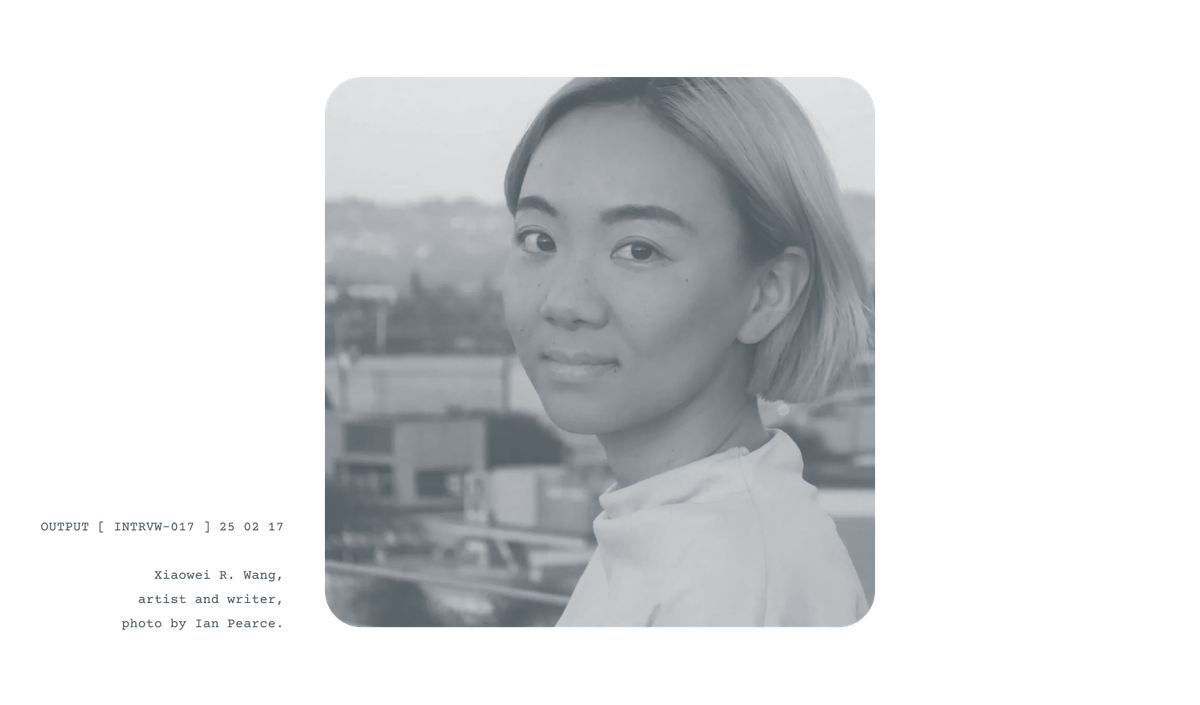Xiaowei R. Wang, Writer and Artist

Xiaowei R. Wang, PhD is an artist, writer, organizer and coder, and amongst other things the author of Blockchain Chicken Farm.
APOSSIBLE™ is a non-profit bringing psychologists, technologists, artists and creatives together to explore how technology can better support creativity and human fulfillment. In this ongoing interview series we’re discovering what people value, what makes their lives fulfilling, and what kinds of relationships to technology they already cherish.
1. What is a ritual, practice, or routine in your life that is important for your psychological wellbeing and/or fulfillment? Why?
Breathing and mindfulness. The practice of: breathing in, being aware that I am breathing in, breathing out, I am aware that I am breathing out. Breathing is something that all living beings do in some form that is automatic and innate. Rather than searching for things outside of us — the better house, the better job, the better morning routine, breathing is a reminder that there is an intrinsic capacity for life within all of us. It also reminds us of the knife’s edge of life death: this could be my last breath. In that, I always think of how we are all so close to death all the time, and how we are all headed to the same place: the coffin, the urn, the earth. Yet because of these oppressive structures in the world we live in, breathing, breath, and even the possibility of dying a good death from old age are not equally accessible to everyone. Every time I breathe in and out mindfully, unencumbered, I feel so grateful and am reminded — what more could I ask for? Why should I orient my life to accumulating more and more?
2. What is a human-made creation that brings out the best in you? Why?
I’ve been working a lot with e-textiles, radio and clay recently, and all of these tools and mediums are enormously grounding and cultivate in me a sense of critical wonder – a reminder of how deeply connected we are to earth despite our imagined distance in contemporary life. Radio is fascinating – I’ve been experimenting with conductive textiles as antennae for radio transmissions, but even without textiles, our bodies, any living being in which electrons can flow through, are excellent antennas that can transmit and receive radio waves. I had a friend come to my studio to look at a piece, and when I turned the AM transmitter on, at first he wasn’t picking up anything with his radio. After I put my hand on the transmitter antennae and pointed towards his radio, he picked up the broadcast. It’s an experience that reminds us of how primary the electromagnetic spectrum — light, sound, radio, wifi — is. As Darrah Blackwater says, electromagnetic spectrum is a natural resource the same way water and air is.
All of this ties into e-textiles and clay because as I'm working with conductive thread made of stainless steel and hardware, I am reminded of the material transformations, the alchemy at the heart of modern life. For example, glazes for ceramics (made of silica and metals like cobalt or magnesium) are becoming more expensive, as cobalt and silica are being used more and more for semiconductors and fiber optics. It’s like we realized how to transform and alchemize earth thousands of years ago but we’ve decided in recent history to route our efforts to something a little more perverse. Working with textiles and clay grounds me in a different sense of time and renews my sense of wonder.
3. When do you cherish the slow or hard way of doing something? Why?
This is an interesting question. I always prefer the slow or hard way and I can say this because I’m very fortunate enough to be in a place in life where my basic needs are met: shelter, food, community. I have a garden that I love that teaches me a lot about time, cycles and planting seeds. There are many people in the world who also experience a life where they must exert enormous effort into simply living and having basic needs. So, I’m wary of the attitude that we all must slow down or do things the hard way; I think for a certain class of people, myself included, we are lucky enough to embrace constraint and leave behind comfort or convenience. A lot of this thinking is informed by Kohei Saito’s concept of the imperial mode of living, and his book is an excellent provocation of how those of us living in the imperial centers, at this time of enormous polycrisis, must embrace different ways of being. It’s hard though: I also live in a context where being efficient and fast is not only valued, it’s rewarded.
4. What is something you appreciate or long for from the past? Why?
In researching for a recent piece, I was looking at embroidery patterns from Guizhou, China. The embroidery patterns are actually held by village shamans as they are considered sacred knowledge: sacred about the land, about place, cosmologies that have existed for time unknown. It instilled in me a sense of humility and also made me ask: what survives? We no longer use the telegraph, but here we are, some of us still embroidering and weaving meaning and stories into fabric. A good reminder that perhaps, time is more of a spiral or a circle than an arrow of progress.
